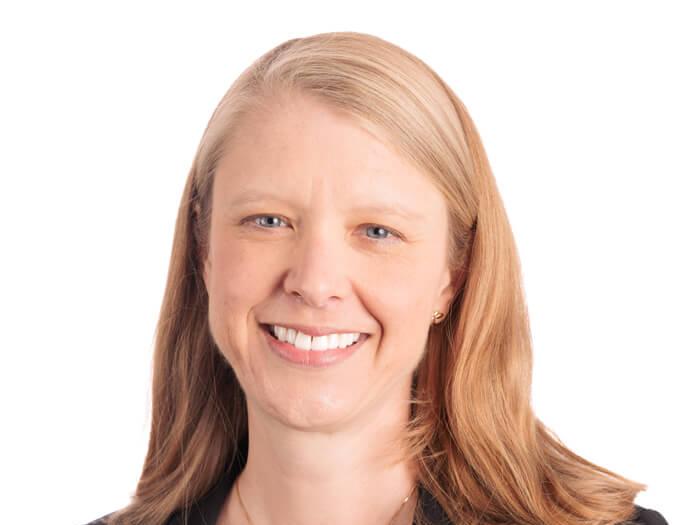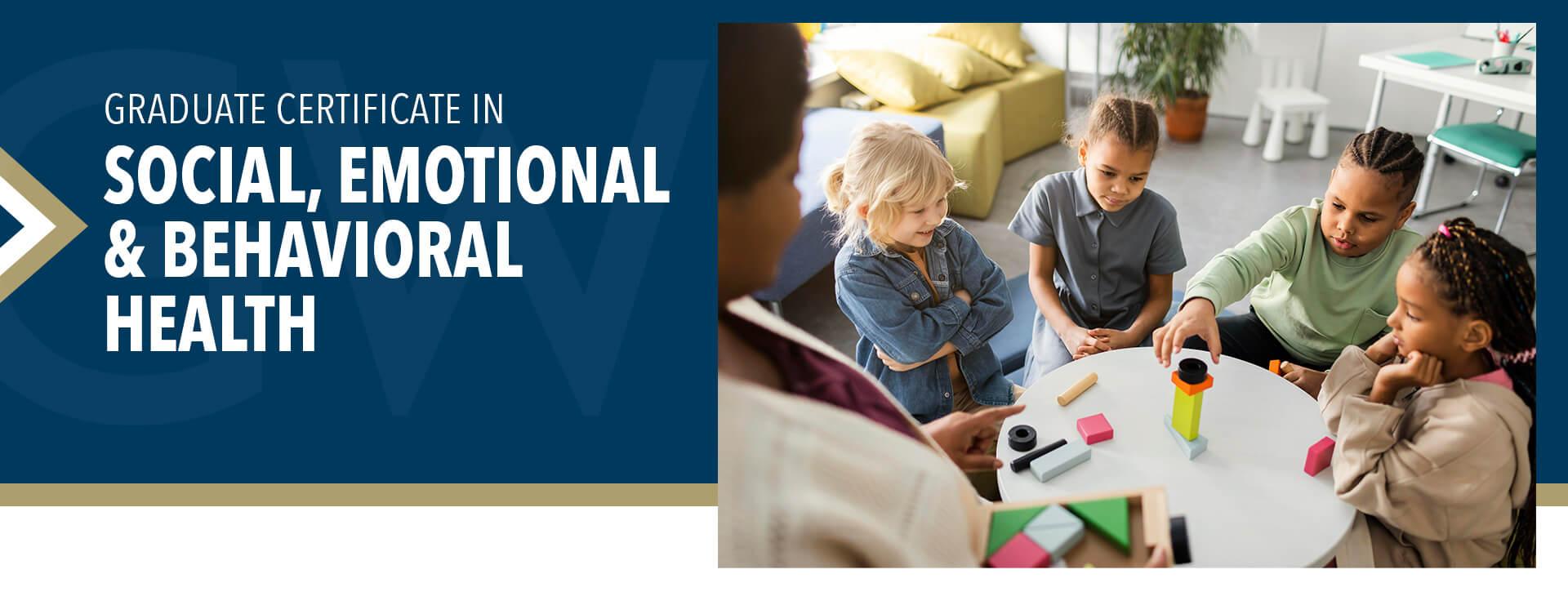Graduate Certificate in Social, Emotional, and Behavioral Health
Supporting the Whole Child
Evidence-Based Strategies for Social, Emotional, and Behavioral Growth
GW's Graduate Certificate in Social, Emotional, and Behavioral Health is grounded in research and driven by a call to action: to prepare responsive education professionals who recognize the complex, interconnected nature of students’ social, emotional, and behavioral development.
Designed for teachers, administrators, and school-based professionals, this certificate equips graduates to move beyond viewing student behavior as a problem to be managed—and instead approach each learner with evidence-based strategies, empathy, and a deep understanding of how children grow. Participants will explore how to create culturally responsive, developmentally informed, and dynamic learning experiences that foster positive growth for all students, particularly those from diverse backgrounds.
Prepare to disrupt outdated disciplinary practices and instead implement inclusive, equity-driven supports that prioritize student well-being and whole-child development.
A Stepping Stone to a Master's Degree
Students can complete the program as a stand-alone certificate or apply the credit hours toward the Master's in Special Education Non-Licensure Track.
*If accepted and all requirements met
Accessible + Flexible
Complete the program fully online, wherever you are in the world. Synchronous sessions are scheduled once weekly in evenings to accommodate working professionals.
Scholar-Practitioner Faculty
Receive 1:1 mentorship and live, interactive course delivery from leading faculty that bring diverse professional experiences in the field.
Degree Awarded:
Graduate Certificate in Social, Emotional & Behavioral Health
Department:
Special Education and Disability Studies
Course Delivery:
Online
Program Entry:
Spring, Fall
- Our Mission
GSEHD's Department of Special Education & Disability Studies programs are dedicated to preparing knowledgeable, effective, and ethical special education professionals to serve diverse students with disabilities and their families. Our programs are grounded in the philosophical position that teaching is an act of transformative social justice, operationalized and actualized through the practice of personalized teaching and learning.
- Curriculum
The following requirements must be fulfilled: 12 credits in required courses.
Code Title Required SPED 6204 Analysis of Personalized Teaching for Professionals Working with Students with Disabilities SPED 6240 Family Support and Collaboration in Special Education SPED 6288 Understanding the Characteristics and Needs of Students with Disabilities SPED 6290 Affective Development and Behavior Management for Teaching Students with Disabilities - Program Outcomes
The Graduate Certificate in the Science of Reading prepares educators to develop deep knowledge in the science of reading and scientifically based reading instruction.
- Graduate students will be able to demonstrate knowledge of culturally responsive social, emotional, and behavioral health concepts and interventions for diverse students with and at-risk for disabilities.
- Graduate students will be able to identify, design, deliver, and assess effective evidence-supported social-emotional instructional approaches and curricula and proactive behavioral health supports and interventions for all students, including those at-risk for and/or identified with disabilities.
- Graduate students will be able to demonstrate the ability to reflect on the effectiveness of social, emotional, and behavioral health approaches, interventions, and curricular outcomes and effective collaboration with families and other school personnel, and utilize those reflections to ensure every child has the opportunity to develop their social, emotional, and behavioral health.
The GW Advantage
Whether on-campus or online, a GW education offers a distinctive, high-impact experience. Our online courses mirror the rigor and engagement of the classroom, while offering the flexibility of distance learning. You'll learn from nationally recognized scholar-practitioner faculty who bring real-world insight and diverse perspectives. With personalized mentorship and a high-touch learning environment, you’ll gain the skills to advance your career—and transform the educational experiences of your students.
Career Outlook
Educators and school professionals equipped with this certificate are prepared to lead efforts that improve student well-being, transform school culture, and implement inclusive, evidence-based practices that address the growing demand for social, emotional, and behavioral support in schools. Whether in the classroom or at the systems level, graduates are positioned to take on roles that foster whole-child development and promote positive learning environments.
Graduates may also pursue further education or licensure to expand their impact in mental health, special education, or educational leadership. This certificate enhances resumes and credentials for professionals seeking to advance in K–12 school systems, education nonprofits, and community-based youth programs.
- Common Career Paths
Please note: Teaching licensure or additional certification may be required for the following career paths.
In Schools and Districts
- Social-Emotional Learning (SEL) Coordinator: Leads school- or district-wide efforts to integrate SEL into curriculum and culture, designing initiatives that foster emotional intelligence, empathy, and interpersonal skills.
- Student Support Specialist: Works directly with students to identify social, emotional, or behavioral challenges and coordinate individualized supports in collaboration with teachers and families.
- Behavior Interventionist: Implements targeted, evidence-based interventions to support students with challenging behaviors, often as part of a school’s behavioral response team.
- Classroom Teacher with SEL/Behavioral Expertise: Applies specialized strategies to create inclusive, emotionally safe classrooms that support all learners—particularly those struggling with behavior or emotional regulation.
- Positive Behavior Interventions and Supports (PBIS) Coach: Facilitates the implementation of school-wide PBIS frameworks, training staff on proactive strategies to reinforce positive behaviors and build supportive environments.
- MTSS (Multi-Tiered System of Supports) Team Member: Collaborates with educators and administrators to develop tiered interventions addressing academic, behavioral, and emotional needs of students.
- Equity and Inclusion Coordinator: Champions equitable educational practices and ensures that school policies and programs are inclusive and responsive to the needs of diverse student populations.
- Assistant Principal or Principal (with licensure): Leads school efforts to build a positive culture around behavior and emotional health, using data-driven approaches to improve student outcomes.
Curriculum and Assessment
- Instructional Coach or Curriculum Specialist: Provides guidance to teachers on integrating SEL and behavioral health into instruction, curriculum planning, and classroom management.
Beyond the Classroom
- Youth Program Director or Community Education Leader: Oversees out-of-school programs that support the holistic development of youth, often integrating SEL, mentorship, and community engagement.
- Professional Development Trainer for SEL and Behavior: Designs and delivers workshops and training sessions that build staff capacity in SEL, trauma-informed practice, and behavior support.
- Educational Consultant (Behavioral Support Focus): Advises schools, districts, or nonprofits on implementing effective, research-based behavioral supports and SEL programs.
Apply Now
Applications are not currently being accepted for this program. For more information or to inquire about the next admissions cycle, contact the GSEHD Admissions Team at teachinfo![]() gwu [dot] edu (teachinfo[at]gwu[dot]edu) or 202-994-9283.
gwu [dot] edu (teachinfo[at]gwu[dot]edu) or 202-994-9283.
To be considered for admission, applicants must submit the online application form as well as the following required supporting documents. There is no application fee.
- Prerequisite: Bachelor's Degree
- Resume
- Transcripts from all previously attended colleges or universities
- Statement of Purpose
- One Letter of Recommendation
*Additional application requirements may exist for international applicants.
Applications are not currently being accepted for this program. For more information or to inquire about the next admissions cycle, contact the GSEHD Admissions Team at teachinfo![]() gwu [dot] edu (teachinfo[at]gwu[dot]edu) or 202-994-9283.
gwu [dot] edu (teachinfo[at]gwu[dot]edu) or 202-994-9283.
Tuition & Financial Aid
We know embarking upon graduate school is a big decision - due in part to the costs of attending. At GW, we understand the time and thought behind making graduate school work for you. Please take a moment to learn more about the options and opportunities available to help fund your graduate education.
Graduate tuition is charged per credit hour, unless otherwise noted. Rates vary by program and location.
The tuition rate* for the Graduate Certificate in Social, Emotional, and Behavioral Health program is $1,000 per credit hour.
This program requires 12 credits.
Please note: Additional fees may apply for international students, late fees, etc. Current tuition rates may be updated during the year.
*Fall 2025 and Spring 2026



Assistant Professor, Special Education and Disability Studies


Department Chair and Associate Professor, Special Education and Disability Studies


